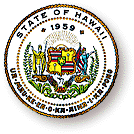Schools get
extra $11.7M
Part of the funds will help with
the needs of autistic students
Hawaii public schools will get $5.6 million more in state money to help cope with a 40 percent increase in autistic students since 2002.
 The money is part of a nearly $11.7 million emergency appropriation requested by the Board of Education and approved by the state Legislature.
The money is part of a nearly $11.7 million emergency appropriation requested by the Board of Education and approved by the state Legislature.
Gov. Linda Lingle signed Senate Bill 778 on Friday to provide an emergency appropriation from the fiscal year 2005 general fund budget. Of that amount, $5,652,754 will go toward services for autistic students and $6,019,810 to cover increased school-based behavioral health services.
"These funds will ensure students with the greatest needs receive appropriate services and that the state fulfills its responsibility to serve all students," Lingle said in a news release last night.
The money was to be released immediately after Lingle signed the measure.
Department of Education spokeswoman Sandy Goya said school officials welcome the funds. "These funds were necessary for the DOE to pay for services for this year," she said.
Autism is a spectrum of neuropsychiatric disorders affecting a person's ability to interact socially and communicate.
As of April there were 1,123 children with autism spectrum disorder in Hawaii public schools, Goya said. The number has jumped about 40 percent from 801 children in July 2002 when the administrative and fiscal responsibilities for services to autistic children were transferred to the DOE from the Department of Health.
At that time, $25,450,494 was transferred from the Health Department to the Education Department for the federally mandated program.
Despite the increase of autistic students, the budget has not grown since then, according to the Governor's Office.
Autistic children made up 3.1 percent of students enrolled in special education in 2002, compared with 1 percent nationally, an official of the Autism Society of Hawaii said last year.
Lee Grossman of the Autism Society of America has said much of the cost for services for the autism population can be reduced with early diagnosis and intensive intervention.
The emergency funds will also be used to pay for school-based behavioral health services provided to 10,668 students. The money will pay for increased school services for children covered by the Felix consent decree, who cannot participate in classroom-based activities.
[News] [Business] [Features] [Sports] [Editorial] [Do It Electric!]
[Classified Ads] [Search] [Subscribe] [Info] [Letter to Editor]
[Feedback]
